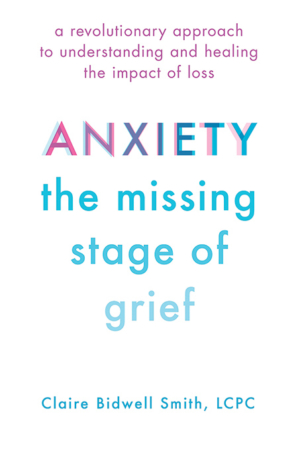The walls feel like they’re closing in.
You can’t breath, your mouth is dry, you’re dizzy, and your heart pounds. Not to make it any less scary, but it isn’t the first time you’ve had a panic attack like this; you’ve had a lot of them since the funeral last summer. In the new book “Anxiety: The Missing Stage of Grief” by Claire Bidwell Smith, LCPC, you’ll see how, when the walls close in, you can open a door.
It started at a crossroad in her life: when she was fifteen, both of Claire Bidwell Smith’s parents were diagnosed with cancer at the same time. She became a caretaker and felt isolated; after her mother died, she had her first panic attack and it ultimately changed everything. Once her father was gone, too, Smith decided to make grief her life’s work.
When it comes to grieving, she says, there is no “wrong,” but there are things we get wrong — especially the “Five Stages of Grief.” Those, according to author Elisabeth Kübler-Ross, were written for the dying, not for those who grieve. Grief, says Smith, makes other emotions surface — and one of those is anxiety.
To be anxious is to be afraid of something, “real or imagined.” It’s being hypervigilant or over-reactive, sometimes unnecessarily. While it’s true that general anxiety can be good, even helpful, what sets it apart from grief-based anxiety is that the latter stems “directly from the experience of loss.” Specifically, we’re anxious after loss because “we are not coping with [the loss] adequately.” While you shouldn’t ever be afraid to ask for professional help, there are things you can do yourself to work through this.
First, understand that death itself affects how you grieve: grief over sudden loss is different than grief after long-term illness. Talk to people, tell your story, or join a “grief group.” Reach inside and rely on your own resilience, journal what you’re feeling, and find a way to honor your loved one’s life. And finally, face death by preparing for your own demise. It’s “one of the best ways to overcome our anxiety…”
“Anxiety: The Missing Stage of Grief” is great in premise but rough in reading.
The most obvious thing that readers may notice is repetition, and not in a good way: there are several instances in which phrases are reused, almost word-for-word, and that can be distracting. There are also instances of head-scratching contradiction.
And yet, certainly, there’s help inside this book — examples of other’s struggles, exercises to open minds, and questions for insight — and those are things that can’t be ignored if you’re hurting. That’s in addition to author Claire Bidwell Smith’s calming tone, which is easy to understand and sensible, as well as comforting, in a we-can-fix-this way that will resonate with readers who need that.
Overall, “Anxiety: The Missing Stage of Grief” has its rough spots, but might be good to have in your arsenal if you do, too. It’s bumpy, but it may be the thing when you’re up against the wall.
“Anxiety: The Missing Stage of Grief” by Claire Bidwell Smith, LCPC
c.2018, Lifelong Books
$26.00 / $34.00 Canada
272 pages





Leave a Comment
Your email address will not be published. Required fields are marked with *